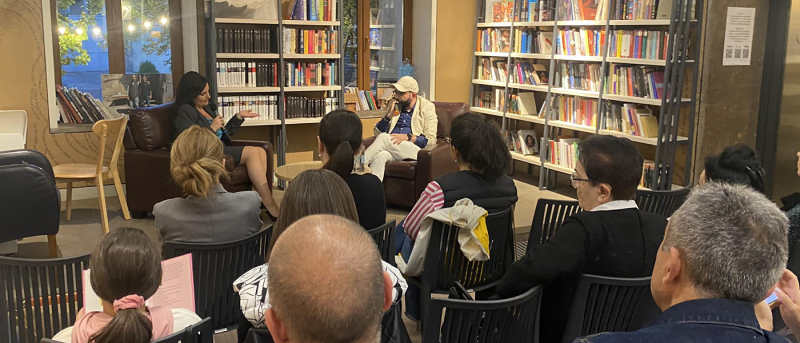How to help forcibly displaced people? Meeting with American Armenian writer Anna Astvatsaturian Turcotte

American-Armenian writer and philanthropist Anna Astvatsaturian Turcotte is in Armenia to help and provide psychological support to compatriots forcibly displaced from Artsakh. The writer's meeting was held at the Common Ground Books & Spirits literary ca
The writer came to her motherland from America after seeing the photos of forcibly displaced Armenians from Artsakh. Now is the most important moment to help compatriots and provide psychological support. She knows what forced displacement means, the fear and uncertainty that comes with it; “The topic of Artsakh is my personal issue. That is my life. From the age of 9, when the Sumgait pogroms began, I learned about Artsakh, my grandmother told me. In those days I used to see my restless parents. My grandmother suggested writing a diary, at the age of 14 I translated it, and at the age of 36 I published it for my children so that they would know how we ended up in the USA”.
The content of “Nowhere, a Story of Exile” expresses what the writer initially felt during the first days of the forced displacement. As soon as they arrived in Armenia from Baku, the next shock awaited them. No one wanted to accept and help them here either. Two years later, Anna Astvatsaturian's family left and settled in the USA. “Can Armenians and Azerbaijanis live together?” When they say that Armenians and Azerbaijanis lived together, they only mean Baku, it was an intellectual, international city. Many nations lived there. Armenians knew their place, we were never school directors, we were assistants of directors, you had to pay money to enter the university because they didn't nominate us”.
More than 100,000 Artsakh citizens are in Armenia today. According to Anna Astvatsaturian Turcotte, in addition to humanitarian aid, they need human and psychological support. “When we came in the 80s, there were no talks about psychological issues. My father had a heart attack, I have health problems. We tried to live as if nothing had happened, we tried to forget. A lot is changing now. Now there are services that help people”.
In 2020, the writer created the “Anna Astvatsaturian” foundation, within the framework of which she expanded charitable activities in post-war Artsakh. That project continues today. “Yesterday, we distributed the children of August-September, we could not do that before because of the blockade. Today, I am very happy when I see how people help by volunteering and giving strength to them. And when we arrived, there was no electricity, no water, no bus. There was no food at all. There are more opportunities to help now. I think people are smarter, and wiser now. We lived in a terrible basement. All my horrors are connected with that place. It was cold, I had no shoes. I had one pair of shoes for a whole year. It was a terrible situation at school. They accused us and treated us badly”.
The writer's advice to all of us. Support the people of Artsakh and do not blame them, the biggest help is to provide them with work. Otherwise, we will lose them, like we lost the Armenians of Baku.
Read also

At Winterfest 2026, Newmag will present Henrikh Mkhitaryan’s memoir “My Life Always at the Center” (trailer)

Winterfest to feature David Georgyan’s sci-fi action novel Impedance (trailer)

At Winterfest 2026, Newmag will present Marianna Hakobyan’s “Don’t Change the Names” (trailer)

Closing and Award Ceremony of the “Sprout in Armenian – 2025” Competition at Newmag Winterfest

